 CureSearch Acceleration Initiative researcher Dr. Richard Gilbertson recently sat down with Cancer Research UK to discuss childhood cancers and his work in pediatric oncology. See below for an excerpt from that interview, or read the full article here.
CureSearch Acceleration Initiative researcher Dr. Richard Gilbertson recently sat down with Cancer Research UK to discuss childhood cancers and his work in pediatric oncology. See below for an excerpt from that interview, or read the full article here.
(Cancer Research UK) – What made you decide to pursue a career in children’s cancers?
At medical school, as a 19 year old, I was particularly interested in a type of children’s brain tumor called medulloblastoma. And here I am at the age of 48 still working on it – so why did it profoundly affect me?
There were two things that really stick in my mind: the first was as a medical student in the 1980s. I walked into a pediatric ward and there was a dark corner where a family was gathered around a child in a bed. We were told that we weren’t allowed to go in, because the child was dying of a brain tumor.
I asked what treatments were available for her, and they said: “There aren’t any. We’ve done everything we can. All we can do now is let her die in peace.”
And that just really angered me. How can the only option be to let a child die in peace?
After that I decided I wanted to do something about children’s brains tumors.
The other incident was later that year in the pub with my friend Nigel, another medical student, after a long night on call together. We were talking about our long term ambitions and goals. And Nigel said to me that, as doctors – whether we work in geriatrics, pediatrics or whatever – at the end of our career we should aim to have been responsible for a 15 percent reduction in deaths from diseases affecting those patients.
The idea of having a measurable goal, rather than just a career in medicine, profoundly affected me. It’s the reason that in the year 2000 I left the UK for St Jude’s Children’s Research Hospital in the US, and dedicated all my time to research understanding childhood brain tumors.
It was a struggle to give up seeing patients because I absolutely loved clinical medicine, but I felt that the lab, rather than the clinic, was the place I could have the greatest impact for all children with brain tumors, wherever they lived. The lab was where I was most likely to achieve that 15 percent drop in mortality.
